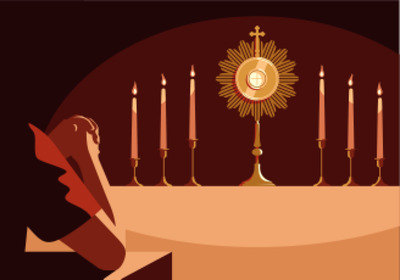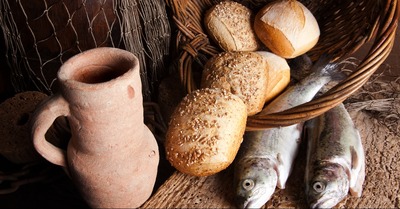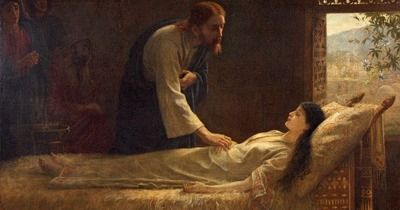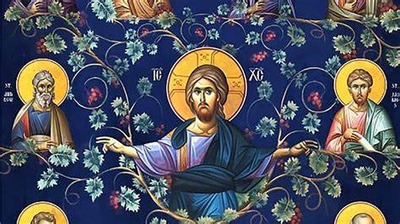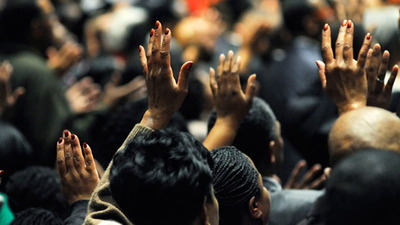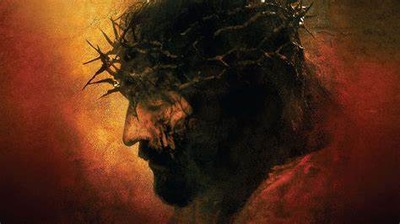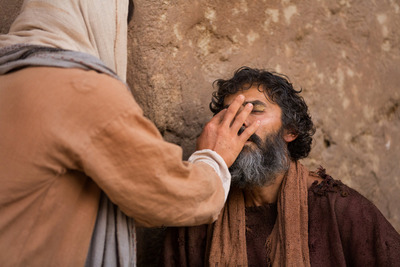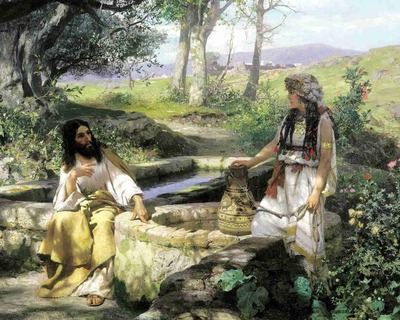August 25, 2024
|by N W
|
0 Comments
|
Deacon Mark, Eucharist, Faith, Holy Spirit, Mary, Reconciliation, Sacraments
Twenty-first Sunday in Ordinary Time
August 25, 2024 — Year B
Readings: Jos 24:1-2a, 15-17, 18b / Ps 34 / Eph 5:21-32 / Jn 6:60-69
by Rev. Mr. Mark De La Hunt, Permanent Deacon
The Holy Spirit rewrote my homily this morning. He has never done that before. He wrote this homily on Saturday morning in two hours and forty-five minutes, when it normally takes me twelve hours over the course of a month. I am sharing that with you, because I am guessing the Holy Spirit did this because He knew people were going to come to Mass this weekend needing to be healed of something or needing to have their life reordered in a way that was not going to happen with my first homily. He reoriented my homily to be more about testimony, sacraments, and life than about scripture and apologetics (i.e., defense of the faith).
The Holy Spirit highlighted five verses from today’s gospel on John 6. As I pondered them, I saw them as a summary of our life with the Holy Trinity.
- We say, “This saying is hard, who can accept it (Jn 6:60)?”
- Jesus, somewhat sarcastically says, “For this reason I have said to you no one can come to me unless it is granted him by my Father (65).”
- Still, instead of surrendering to His Father’s will we act on our own and, “As a result of this many of His disciples returned to their former way of life (Jn 6:66).”
- Jesus asks those of us remaining, “Do you also want to leave (67)?”
- We, the mystical body of Christ respond, “Lord, to whom can we go? You have the words of eternal life. We have come to believe and know that you are the Holy One of God (68-69).”
(By the way, guess what the verse is for “They returned to their former way of life”? It is 66, as in Jn 6:66. This was not a clever writing technique by the apostle, John. The Bible did not come with chapters and verses; they were added hundreds of years later by the Catholic Church under the guidance of the Holy Spirit.)
If the Holy Spirit guided the numbering of the verses, then verse 66 must be important to us. What does it mean to return to our former way of life? For the Jews that day, it meant returning to a life where death was final, and where some religious rituals had become corrupted: things like getting a bill of divorce for practically any reason and stopping financial assistance for aging parents by dedicating that money to the temple (Mt 15:3-6).
Similarly, before Jesus came and established the Catholic Church, the former way of life in Rome and Europe was one of worshipping creation, what we call pantheism and paganism. They also worshipped manmade idols that represented many gods. Under these beliefs, the strong dominated the weak. Men dominated women. The wealthy dominated the poor and abandoned the sick when plagues came through. Wealthy men received an education, not the poor and not women. Sex was an act of domination, not love. Infanticide was common, especially if the baby was female (Hahn 75).
The horror show I just described is why Joshua and the Israelites in the first reading chose the one true God over the many gods of their neighbors. Their neighbors’ many gods demanded sacrifice of them (including of babies for the god Baal). Their one true God, whom we know as Father, Son, and Holy Spirit, sacrificed Himself for our good.
As crazy as the former way of life in Rome and Europe sounds, many of those horrors are happening again as more and more people turn away from the one true God. Infanticide was common in China when their atheist (no god) government forced the one-child policy on their people. Tragically, infanticide happens in our country too. Also, in our country, the young and the strong can legally kill the old and the sick under the sinisterly named movement “Death with Dignity.” Domination and degradation of women is everywhere and is glorified. Education is trending down, especially for the poor. Marriage is being redefined to be “anything goes,” while traditional families are struggling to survive. Even our fundamental identity as men and women is being redefined and worse, becoming undefined.
The world is moving from order to disorder. One God brings order to the world. Many gods or no-god brings the world disorder or chaos. This is true for the world as a whole, for governments, and for us in our personal life. Even authentic religions that have been around since before Jesus have significant disorder, such as no hope of an eternal life with no more pain and no more tears. These ancient religions often have no respect and love for the poor and weak either. Mother Teresa was once asked by Jansenist priests in India to care for one of their sick priests, because their religion forbade them to do so.
Ok. That is a lot, and it can be disturbing and rob us of our peace. Let’s turn away from the darkness now and focus on the Light. If we want order and sanity and peace in our lives, we must center them on Jesus, the one true God. How do we center on Him? First, we center our life on Him in the Eucharist.
Henri de Lubac, a French priest and prominent theologian, said it this way, “If we are to grow in love and holiness, we must make the Eucharist the center of our lives, because in doing so, we make Christ the center of our lives. If we receive Christ worthily in the Eucharist and worship Him in Eucharistic adoration, He will fill us with His grace and enlarge our hearts to love and serve more perfectly (Martin 131).”
Here is a story about Jesus in the flesh, in the Eucharist bringing order and sanity and peace into the life of a seventeen-year-old boy, right here in Holy Name of Mary about fifteen years ago. He was a tall altar server who towered over Fr. Sal (inside joke). He participated in parish faith formation, youth group mission trips, DYC, and diocesan retreats. But he found his life to be a struggle and confusing, especially the tension between teenage hormones and Catholic teaching. Know what I mean teenagers, and twenty somethings, and thirty somethings, etc.?
He came to church on Wednesday evening for confession, and afterwards walked into the nave to pray his Fr. Sal penance of one Our Father and One Hail Mary in thanksgiving for God’s forgiveness. On Wednesday’s there is also Adoration, so Jesus’ body in the Eucharist was on the altar in the monstrance.
The young man bowed down his head in prayer, but then heard a Voice say, “Noah, look up. I am right here.” He blew it off as being his own thought and kept his head bowed down. The Voice came again, tenderly, “Noah, look up. I am right here.” Noah told me that at that moment, he went from knowing about God to knowing God deep down, as a loving Father who is merciful and who is with him and for him. This was especially poignant, since Noah had just come out of Confession.
By the way, what Noah experienced could be described as an awakening of the Holy Spirit’s gift of knowledge noted in Isaiah 11, which we all received in the Sacrament of Confirmation. It had been dormant, but Jesus in the Eucharist sent the Holy Spirit to Noah to fan it into flame. In a way, Noah had experienced a theophany.
I asked Noah to explain the Voice. He said it was not a sound, and it was not a thought. I asked him how he knew it was not a thought. He went on to describe it with the same phrase that the woman in my Eucharist story from my last homily used (It is as if the Holy Spirit is at work here 😉). Remember how the smell of candles by the monstrance brought her back to her grandma’s house and her grandma’s hug and a feeling of safety? She told me that the feelings were “even more intense than when grandma was alive?” Noah told me that the Voice was “more intense” than a thought. And the Voice did not come as thoughts do; it did not feel like his thought. It came from outside, not from within.
This is how the Holy Spirit moves through the Body of Christ. He speaks to all of us and even uses the same words like “more intense.” Noah and that woman do not know each other and have never met.
Noah and that woman, though, know their answer to Jesus’ question, “Do you also want to leave [Me]?” They and all of us, say with Peter, “Master, to whom shall we go? You have the words of eternal life -this is My body…this is My blood.” If the homilies are boring, or the music is lifeless, or the people in the pews next to us are cold, we still come faithfully for Mass and for Adoration. In other words, we come for Jesus in the flesh.
We don’t just have a personal relationship with Jesus; we have an intimate relationship with Him. Because it is not just spiritual, but is also physical (flesh and blood) in the Eucharist, it is “more intense” than a personal relationship! That is why today’s second reading is about marriage, the most intimate and intense relationship two human beings can have. In the marital embrace, one man and one woman give themselves to each other mind, body, and soul, withholding nothing including their fertility. This becoming one in the flesh in marriage is a sign of the Eucharist.
At Holy Communion, Jesus, the groom, waits for His bride (us) at the altar and consummates that relationship by entering into us: body, soul, and divinity. The entirety of scripture from Genesis to Revelation builds up to the Eucharist here on earth that we may be at the Wedding Supper of the Lamb at Mass and in heaven when we are born to eternal life. John saw this in a vision and wrote about it in the book of Revelation.
Before their wedding day, the bride and groom go to Confession to empty their soul of disordered things, so that there is room for all the grace and order God desires to pour into their newly married life. So too, we should go to Confession regularly to make room in our soul for all the grace and order our Groom desires to give to us in the Eucharist.
If you have not been to Confession in a long time, you need to go. You are in spiritual danger. People do not just wake up one day and commit mortal sin, wrecking their life and the lives of others. This happens after a thousand small bad decisions or venial sins are committed but not confessed. Confession opens our eyes to our sinfulness, blots out those sins, and protects us from making a terrible mistake.
Here are a few takeaways.
- To center our life on the Eucharist is to center our life on Jesus (Martin 131).
- When our life is centered on Jesus, we become free, free from oversensitivity to criticism and from a need for honor, wealth, power, and pleasure.
- Free from those disordered desires, we have a greater capacity to receive Jesus’ grace so that we can love others as Jesus loves us, unconditionally. St. John Paul II said freedom is measured by our capacity to love.
- Therefore, when centered on the Eucharist, our life becomes ordered through Jesus, increasing our capacity to love our spouses, our parents, our friends, and, quite frankly, to be better evangelists.
To increase your centeredness on Jesus in the Eucharist, sign up for the next Holy Name of Mary all-night adoration. It begins every fourth Saturday of the month, starting at 7 PM. Or go to adoration at Holy Name of Mary on Wednesdays between 10 AM and 6:45 PM. If you show up at 5 PM, like Noah in the story, you can go to Confession while you are there, to make as much room in your soul as possible for all the grace Jesus wants to give you. Stay a little longer, and you can even go to Mass at 7 PM, scoring a Catholic hat trick (hockey reference) of grace with these three encounters with Jesus.
If, after all I have shared, you still struggle to see Jesus in the Eucharist, or you start to struggle months from now, then turn to His mother. She always leads us to her Son. Let’s turn to her help now.
Mother Mary, you first held baby Jesus in the town of Bethlehem, which means house of bread, and placed Him in a manger where animals go for sustenance. When we come forward for Holy Communion today, share with us what you saw when you first looked upon your Son in the Eucharist and share with us the joy you experienced at carrying Him again in your body. Amen.
Citations
- Francis Martin & William M. Wright IV. Catholic Commentary on Sacred Scripture – The Gospel of John. Baker Academic 2015.
- Scott Hahn. Evangelizing Catholics – A Mission Manual for the New Evangelization. The St. Paul Center 2014.
KEEP READING
 540-586-8988
540-586-8988 

